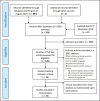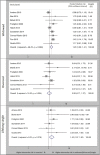Marriage and risk of dementia: systematic review and meta-analysis of observational studies
- PMID: 29183957
- PMCID: PMC5869449
- DOI: 10.1136/jnnp-2017-316274
Marriage and risk of dementia: systematic review and meta-analysis of observational studies
Abstract
Background: Being married is associated with healthier lifestyle behaviours and lower mortality and may reduce risk for dementia due to life-course factors. We conducted a systematic review and meta-analysis of studies of the association between marital status and the risk of developing dementia.
Methods: We searched medical databases and contacted experts in the field for relevant studies reporting the relationship, adjusted for age and sex, between marital status and dementia. We rated methodological quality and conducted random-effects meta-analyses to summarise relative risks of being widowed, divorced or lifelong single, compared with being married. Secondary stratified analyses with meta-regression examined the impact of clinical and social context and study methodology on findings.
Results: We included 15 studies with 812 047 participants. Compared with those who are married, lifelong single (relative risk=1.42 (95% CI 1.07 to 1.90)) and widowed (1.20 (1.02 to 1.41)) people have elevated risk of dementia. We did not find an association in divorced people.Further analyses showed that less education partially confounds the risk in widowhood and worse physical health the elevated risk in lifelong single people. Compared with studies that used clinical registers for ascertaining dementia diagnoses, those which clinically examined all participants found higher risk for being unmarried.
Conclusions: Being married is associated with reduced risk of dementia than widowed and lifelong single people, who are also underdiagnosed in routine clinical practice. Dementia prevention in unmarried people should focus on education and physical health and should consider the possible effect of social engagement as a modifiable risk factor.
© Article author(s) (or their employer(s) unless otherwise stated in the text of the article) 2018. All rights reserved. No commercial use is permitted unless otherwise expressly granted.
Conflict of interest statement
Competing interests: None declared.
Figures


Comment in
-
Marriage and risk of dementia: systematic review and meta-analysis of observational studies.J Neurol Neurosurg Psychiatry. 2018 Mar;89(3):227. doi: 10.1136/jnnp-2017-317178. Epub 2017 Nov 28. J Neurol Neurosurg Psychiatry. 2018. PMID: 29183958 No abstract available.
Similar articles
-
Excess mortality for the unmarried in rural Bangladesh.Int J Epidemiol. 1993 Jun;22(3):445-56. doi: 10.1093/ije/22.3.445. Int J Epidemiol. 1993. PMID: 8359960
-
The Roles of Marital Dissolution and Subsequent Repartnering on Loneliness in Later Life.J Gerontol B Psychol Sci Soc Sci. 2020 Sep 14;75(8):1796-1807. doi: 10.1093/geronb/gbz121. J Gerontol B Psychol Sci Soc Sci. 2020. PMID: 31555823 Free PMC article.
-
Suicide and marital status in Northern Ireland.Soc Psychiatry Psychiatr Epidemiol. 2010 Aug;45(8):795-800. doi: 10.1007/s00127-009-0120-7. Epub 2009 Sep 10. Soc Psychiatry Psychiatr Epidemiol. 2010. PMID: 19763365
-
Marital Status and Risk of Physical Frailty: A Systematic Review and Meta-analysis.J Am Med Dir Assoc. 2020 Mar;21(3):322-330. doi: 10.1016/j.jamda.2019.09.017. Epub 2019 Nov 16. J Am Med Dir Assoc. 2020. PMID: 31740150
-
Does marital status correlate with the female breast cancer risk? A systematic review and meta-analysis of observational studies.PLoS One. 2020 Mar 5;15(3):e0229899. doi: 10.1371/journal.pone.0229899. eCollection 2020. PLoS One. 2020. PMID: 32134997 Free PMC article.
Cited by
-
Introducing the tablet-based Oxford Cognitive Screen-Plus (OCS-Plus) as an assessment tool for subtle cognitive impairments.Sci Rep. 2021 Apr 12;11(1):8000. doi: 10.1038/s41598-021-87287-8. Sci Rep. 2021. PMID: 33846501 Free PMC article.
-
Association of social support with cognition among older adults in China: A cross-sectional study.Front Public Health. 2022 Sep 26;10:947225. doi: 10.3389/fpubh.2022.947225. eCollection 2022. Front Public Health. 2022. PMID: 36225770 Free PMC article.
-
The association between sociodemographic characteristics and dementia in patients with atrial fibrillation.Aging Clin Exp Res. 2020 Nov;32(11):2319-2327. doi: 10.1007/s40520-019-01449-3. Epub 2020 Jan 11. Aging Clin Exp Res. 2020. PMID: 31927710 Free PMC article.
-
What are Romantic Relationships Good for? An Explorative Analysis of the Perceived Benefits of Being in a Relationship.Evol Psychol. 2023 Oct-Dec;21(4):14747049231210245. doi: 10.1177/14747049231210245. Evol Psychol. 2023. PMID: 37908132 Free PMC article.
-
A comparison of sociobehavioral impact on cognitive preservation in Alzheimer's disease between Taiwan and Korea: A cross-national study.Medicine (Baltimore). 2020 Apr;99(15):e19690. doi: 10.1097/MD.0000000000019690. Medicine (Baltimore). 2020. PMID: 32282723 Free PMC article.
References
-
- Prince M, Wimo A, Guerchet M, et al. ; World alzheimer report 2015. The global impact of dementia: an analysis of prevalence, incidence, cost and trends. London: Alzheimer’s Disease International, 2015.
-
- Prince M, Guerchet M, Prina M. The global impact of dementia 2013-2050. London: Alzheimer’s Disease International, 2013.
-
- Matthews FE, Arthur A, Barnes LE, et al. . A two-decade comparison of prevalence of dementia in individuals aged 65 years and older from three geographical areas of England: results of the Cognitive Function and Ageing Study I and II. Lancet 2013;382:1405–12. 10.1016/S0140-6736(13)61570-6 - DOI - PMC - PubMed
Publication types
MeSH terms
Grants and funding
LinkOut - more resources
Full Text Sources
Other Literature Sources
Medical
